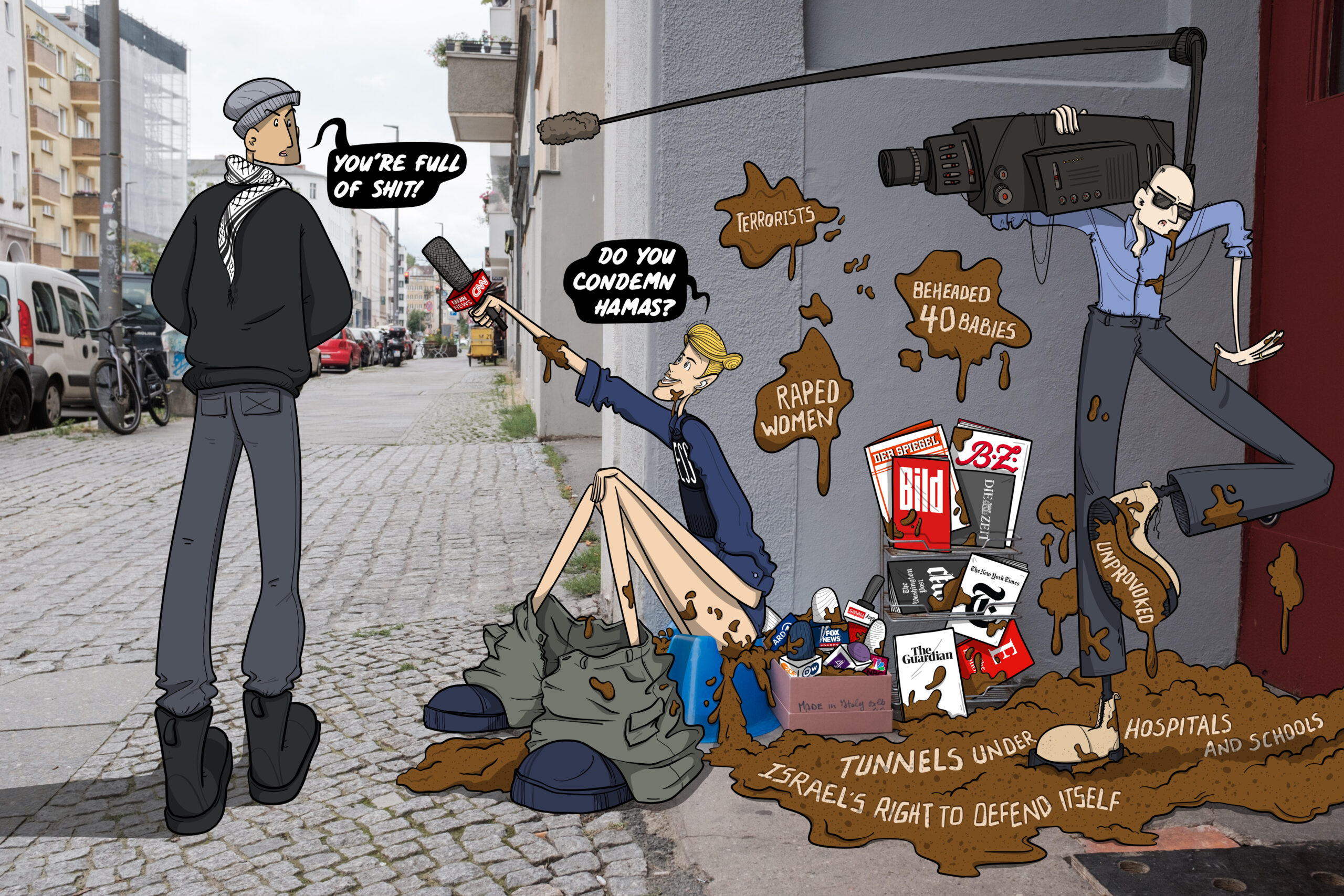When it comes to Palestine/Israel, a pervasive national-identitarian ideology prevents most Germans from thinking for themselves—that is to say, from thinking at all. And from feeling any empathy.
Forget Them, Forget Everything
The “Middle East conflict” hardly ever disappears completely from the news in Germany. Select phrases recur constantly; “the two sides”, “complicated”, “terror”, “right to exist”, “Germany’s special responsibility”, “against antisemitism in any form [1] “.
In their latest work, two German academics who play a leading role in producing this coarse fabric of mechanically repeated argumentative scraps suggestively ask themselves and their readers why Palestinians and their supporters are constantly making such a fuss about this conflict and Palestinian victims.
In a footnote, they compare the number of people killed (“just” over 1000) in Israel’s 2008/09 military operation “Cast Lead” against the Gaza Strip with the considerably higher number of victims—800,000 to 1 million—in the genocide in Rwanda (1995) and other “situations” elsewhere in which human rights violations occurred. These dramas, according to the authors, receive far less attention in Germany than the ”just over” 1,000 Palestinians who died during Cast Lead (according to Israeli figures, 1116 were killed, according to the Palestinian human rights organization PCHR 1417).
What are the authors suggesting, since in the same context they also refer to the 3-D Theory created in 2003 by Israeli politician Natan Sharansky? In Germany, Sharansky’s theory has served as the basis for distinction between legitimate criticism of Israeli policy and antisemitism.One of the 3 Ds of this “theory” refers to “double standard”: If Israel is measured by different, higher and stricter standards than those applied to other states and their policies, then, according to Mr. Sharansky, this is antisemitic (precisely how are statements about the policies of a state connected to a form of gruppenbezogener Menschenfeindlichkeit [2], a thinking person might ask herself—and as soon as this thinking person is tempted to put on Sharansky’s 3D glasses, she or he will get a headache. Nevertheless, they should not be withheld from her).
Here an example of what these number games suggest is “Israel-related antisemitism”: Palestinians and their supporters only make such a fuss about Palestinian victims because they are antisemites.
The war against the population of Gaza has killed more than 27 000 [3] civilians (as of 2024-08-19). The number ever grows: 1000 more, 2000 more… at what point is the death toll remarkable enough to inspire concern in the aforementioned authors (whose work is now distributed by the Federal Agency for Civic Education)? Surely by now it is enough, at the very least for the sake of the Palestinian community in Germany, which accounts for approximately 200,000 residents. Some of them were born and raised in Germany and are German citizens. Others are without any passports, stateless and in limbo for all their lives, “warehoused“, as Israeli anthropologist and activist Jeff Halper puts it.
A neighbor, born and raised in Berlin, granddaughter of Palestinian refugees, tells me that she feels unseen, rejected, almost despised by her German colleagues or neighbors. She understands from their very gestures, the way they look at her, that they don’t want to hear a word from her about Gaza. ‘‘We are being demonized as terrorists or their sympathizers, as Islamists, as anti-Semites even before we open our mouths.’’ A Palestinian friend who worries every hour, every day about his family in Gaza, tells me that he cannot bear any longer to read or watch German media—‘‘I feel as though they are constantly spitting right in my face,’’ he tells me.
Many Palestinians, especially the older generation, learned that in order to be accepted in German society they should rather keep their memories, thoughts and feelings about Palestine to themselves. They came to understand following October 7 that this does not suffice. Since the horrific atrocities committed by Hamas against Israeli civilians, Palestinians (and Arabs, Muslims and others vaguely associated with them) find themselves forced to understand that as Palestinans (Arabs etc.) in Germany they are subject to general suspicion—before they even open their mouths, no matter what they say or do.
German media, politicians across the board and society at large all know that Palestinians cannot possibly agree with what Israel’s politics inflicts on them.
But what can we do, good Germans striving to take responsibility for the crimes of our grandparents? What can we do, when this responsibility has been defined as unconditional support of Israel?
We are ready to offer others an entry ticket to Germany, superpower most moral, under the condition that they sign a declaration affirming Israel’s right to exist and/or that they distance themselves unambiguously from antisemitism and Hamas.
It is disconcerting that German Bildungsbürger, those who enjoy a good education, inform themselves through serious media and consider themselves critical citizens, cannot decipher the very obvious motivations for the close relations between Israel and Germany. As a result, they do not take into account the trivial incentives for German politics in maintaining particularly close relations with Israel, which of course includes helping to shoulder the partner state’s serious problems, in this case: the grudge that Israel has against Palestinians, who still have not disappeared and still refuse to give up their rights.
There are some banal reasons why Israel (and its unresolved issues) never completely disappears from current events and political attention in Germany. In an article titled Bedingungslos für Israel? (Unconditionally for Israel), Ottfried Nassauer, an eminent German peace researcher, wrote that David Ben Gurion and Konrad Adenauer, viewing cooperation as mutually beneficial, eagerly agreed to an unofficial alliance. This was years before diplomatic relations were established between the two young states. The FRG ”generously” funded Israel as part of the Holocaust reparations West Germany was ready to pay— reparations that seldom went to survivors but rather into the military build-up of the state.
In return, Israel graciously turned a blind eye to the young Federal Republic’s good relations with the Arab states, Israel’s enemies. These friendly relations were of course also based on pragmatic considerations. Above all, however, Israel stood by a young West Germany struggling for recognition on the international stage, absolving it of the sins committed by its embarrassing predecessor state. Thus began a wonderful friendship with a stable foundation in common interests.
As with all state relations, it is pragmatic considerations such as these that are the decisive motives for growing close or remaining irreconcilable. Why should this not apply also to German-Israeli relations?
The pragmatic is usually dressed up with some kind of identitarian kitsch in order to make hearts beat faster. The shame and horror once felt by many Germans in the face of the crimes committed by them or their direct ancestors was transformed into a state ideology—hermetic, formulaic, immune to reflection or criticism, especially after Germany had once again become a superpower.
This crude genre of kitsch immunizes against independent thinking, but also against empathy. Not only Palestinians but also Israelis in Germany are shocked by a lack of empathy in their German surroundings. Hardly anyone asks them, “And how are you? Your family? Is anyone close to you affected?”
An ideology like the one behind an ”unconditional solidarity with Israel” tends to reduce thoughts and emotions, uniformly leveling them. This ideology is more about a self-righteous German national identity than about an in-depth exploration of what historical guilt might mean in terms of present responsibility.
A considerable fraction of other countries’ populations consider the State of Israel’s self-definition as the refuge for the Jews of the world, who have been and are under threat, eternally and everywhere, as just and valid. You also find people around the world who are convinced that Israeli policies of occupation, ethnocracy, segregation and merciless campaigns against civilians are justified, if not necessary. In these countries, for example France, Britain, the US and others, you will find not only politicians and adherents to the far Right (unsurprisingly) among these ”unconditional supporters” but also conservatives, neo-liberals and social democrats who. On the other hand, in these societies, parties of the political left, trade unions, anti-racist movements, activists for human rights, anarchists etc., tend to support Palestinian rights, that is, equal rights in all of Palestine/Israel.
German leftists, anti-racists, trade unionists, ecologists and other progressives have instead chosen to creep under an umbrella shielding them from the labor of empathy and the labor of thought wherein we, Germany, are the moral superpower. We have done our homework and continue to do so by supporting Israel, the Jewish state. They remain undisturbed by those who they share it with: the AfD and in general the political Right.
Almost the whole of German society, the media, intellectuals, politicians, from far right to the far left, have thus opted for ”self-incurred tutelage”[4].
There seems to be a strong emotional gain in this option.
With eyes closed in rapture, in lustful anticipatory obedience, in grandiose and pleasurable righteousness, they follow a national ideology according to which we are the moral superpower par excellence, superior to all others.
As the moral superpower that we are, we can—no, we must demand, mercilessly, unconditionally: Bomb them! Destroy them! The barbarians, the antisemites! And of course—we are not inhuman—there should be ”humanitarian corridors” for women and children, for innocent civilians who are abused as human shields by their terrorist cousins-brothers-fathers-husbands.
”Humanitarian corridors”—linger inside them for a moment—imagine yourselves, together with many others, squeezed into such a narrow time-space corridor with the fear of the into which abyss it leads, the fear at the back of your neck and the horror before your eyes, the hopelessness…imagine yourself in it for a brief moment.
On with the program: International humanitarian law should of course be taken into account, so that what needs to be carried out mercilessly by our ally in their ”defense”, can be supported in a morally impeccable manner by us. Framed and cushioned in humanitarian terms!
The Israeli military has long sought advice from experts in international law before it strikes. Such was the case in 2008/09, when Israel bombed the Gaza Strip—not without dropping leaflets on the densely populated areas shortly beforehand to warn those who would be bombed that a bombardment was imminent. Leave your homes immediately, they said, or be hit. If they stayed inside and if they survived, they would of course be considered terrorists. The most moral army in the world only targets terrorist infrastructures. [5]
But where can you go when it rains leaflets above your neighborhood, then, immediately afterwards, bombs?
Even now, Israel is strictly adhering to international humanitarian law by warning the civilian population in good time and asking them to leave the parts of the Gaza Strip that will inevitably be bombed and invaded. To leave. And not to return.
Not worth it this time. Impossible, anyway.
The monstrous vendetta has left nothing to return to in the north of the strip as well as in other parts. Gone. Tabula rasa. Fields of ruins. Rubble.
Buried underneath:
Our children’s toys.
Photos of the dead, those who died in previous bombings.
Our pots, our pans, our cups, our plates.
The trays on which the fragrant rice and chicken were served. Our dead. Grandma’s teapot. Her poems.
Reem’s wedding dress, that she didn’t have the opportunity to wear.
Where is she, anyway?
And Sister’s satchel. The books. The dead.
The dead. The hostages. The dead. The prisoners. The dead. The poets.
Forget them. All of them.
Forget everything.
Footnotes
1 This “any” has become the code word for: ”including and mainly ‘Israel-related antisemitism”






